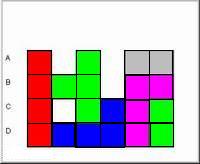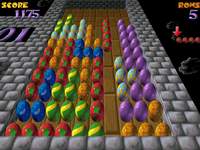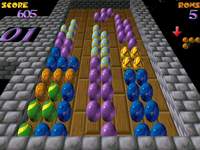PLEASURE OF TIDYING UP (12 february 2004)
Many people say they feel satisfied after tidying up a room or a cupboard. Why would this be?
- The result pleases the eye.
- After tidying up it's easier to find your things.
- In the process, one often finds things back that were considered lost.
- Things usually occupy less space when they're stored in an orderly way.
Wouldn't it be great if everything you'd tidied up would no longer occupy any space at all?
A computer game based on this principle is Tetris. Blocks of different shapes come falling from above. As long as they are falling you can turn them round and shift them to the left or right, so as to allow them to drop into the best-fitting place.
Rows that are completely filled disappear as if by magic. For example: in the diagram below the red block was the last to drop. Now the bottom row is filled up and will disappear. Only rows A, B and C will remain.

To someone who has never played the game, this may sound rather boring. But believe it or not: the game is played with great enthusiasm by millions of people all over the world.
Tetris is very popular. There are hundreds of variations.
three variations
If you want to see more variations, just type Tetris into Google and click images.
In most variations the disappearance of four rows at the same time scores higher than four rows that disappear separately. Needless to say this can only be achieved if you have a block of four bricks long at your disposal:
 long block falling
into empty space
long block falling
into empty space
So in order to get more points, players tend to leave spaces open for these "long" blocks. But if the long blocks don't appear, it's very difficult to fill the gaps, and all you're left with is desperation:
 desperation
desperation
A good Tetris game has several levels of difficulty. The simplest games just increase their speed as the games progresses.
Other games have blocks of different shapes, handicaps in the form of extra blocks - or (almost complete) rows - that appear out of the blue, blocks that are already there at the start of the level, and many more variations.
handicap: rows of cones coming from the bottom
Of course, the point that all players want to avoid as long as possible is when the pile of blocks reaches the ceiling.
game over
Beginning players should always try to keep the pile of bricks as flat and as low as possible. Don't be afraid to leave an occasional hole open: it's much worse if the piles of bricks grow too high, and you don't have enough time and space left to manoeuvre the blocks.
But beware: Tetris can become quite addictive. Many players keep hoping the next game will get better and tend to allow themselves "just one more game". This may go on for hours on end.
The moment you compulsively see images of falling blocks in your mind, it is definitely high time to wait a few days before playing a new game ... or perhaps never to play the game again. For let's be honest: isn't it just a waste of time?